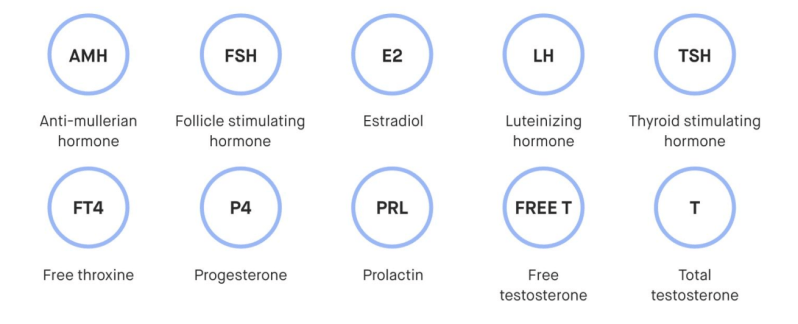Modern Fertility is trying to spark a conversation about fertility. The young San Francisco-based startup wants to educate women about their bodies and hormonal levels, and today announced funding of $1 million, led by First Round Capital, with participation from Box Group, Y Combinator, and angel investors.
“The main problem that we are trying to solve is that women don’t have good information about their fertility,” said Modern Fertility cofounder and CEO Afton Vechery, in an interview with VentureBeat. “It’s something women think about and often stress about, but there’s no good way to ‘check in’ and understand your ability to have kids in the future.”
Vechery and her cofounder, Carly Leahy, created a personalized fertility test women can take at home. Customers prick their finger, put four drops of blood on the included card, and ship it to CLIA-accredited labs. Results are available online after five to seven days through Modern Fertility’s personalized dashboard. These results are reviewed by a medical practitioner who provides a layer of interpretation to help women understand what their hormone levels mean.
The startup measures up to 10 fertility hormones, including the anti-mullerian hormone (AMH), which is generally a good indicator of a woman’s ovarian reserve (how many eggs she has), and prolactin, which can impact the embryo’s ability to implant. If a woman is taking a contraceptive, Modern Fertility will vary the hormone panel accordingly.
June 5th: The AI Audit in NYC
Join us next week in NYC to engage with top executive leaders, delving into strategies for auditing AI models to ensure fairness, optimal performance, and ethical compliance across diverse organizations. Secure your attendance for this exclusive invite-only event.

Above: The hormones included in Modern Fertility tests
Women can preorder the test starting today for $149 — it is expected to ship by the end of this year, according to the cofounders. In the meantime, if customers want to take the test now, they can do so in approved labs. “These are the same tests that are used in clinics today as part of an initial consult,” said Vechery.

There are many other fertility startups out there, which shows how important femtech, or female technology, is becoming. Whether it’s fertility tracking apps like Clue, Glow, or Natural Cycles, or at-home fertility monitoring devices like Ava, the market is there.
But Modern Fertility claims to be addressing a different segment. Rather than focusing on women who are actively trying to conceive by tracking their ovulation peaks, the startup comes in much earlier, before these women start trying to have children.
“We spend our lives talking about prevention rather than preparing for pregnancy,” said Leahy. “The concept should be introduced early on, like your pap smear.”
But what about women who don’t want to have kids? “Some women still really want to know more about their bodies and how these hormones affect them,” said Vechery. “Some of the hormones we test are specific to fertility but also women’s health more broadly.”
After all, we track our fitness and our food, so why not track our fertility and hormones?
Founded in 2017, Modern Fertility is part of Y Combinator’s current batch and will be pitching its concept in less than two weeks at YC’s demo days. This initial round of funding will be used to build up the team in San Francisco.
“There is a huge movement towards personalized medicine and patient empowerment in health care,” wrote First Round Capital partner Phin Barnes, in an email to VentureBeat. “And yet, state of the art advice around one of the most important decisions a woman can make is, ‘just have them before you are 35…’ Modern Fertility will provide the information women need to map out their lives in their own, modern way.”
While direct-to-consumer health care does empower patients, it can also be a very slippery slope. After several FDA smackdowns, highly publicized startups like 23andMe and Theranos have become cautionary tales for those in the health tech world.
Modern Fertility isn’t concerned about those kinds of pitfalls, as it only carries out FDA-approved clinical tests that are reviewed by a medical practitioner. But the conversation about what a patient should do with the results is still missing. Finding out you might be infertile can be devastating, no matter how clear and explicit the results are on your computer screen. So encouraging women to discuss their results with a doctor or gynecologist will hopefully be a top priority for Modern Fertility and others in the field.

